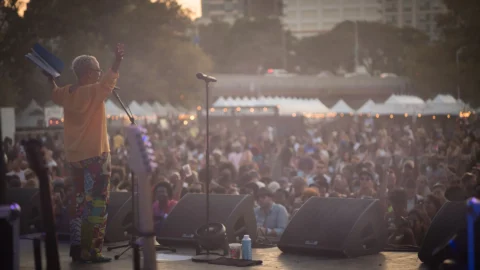It makes sense that a documentary about Nikki Giovanni — a trail-blazing African-American poet and activist carving out her own artistic career in a country dead set against her — could only be told on her own terms. It’s both the greatest strength and the biggest drawback of Going to Mars: The Giovanni Project (Joe Brewster, Michèle Stephenson, 2023) — at once expansive and insightful… and remarkably selective; a fascinating hagiographic portrait that masks a more knotty and interesting character story within.
Having covered a few DOKUARTS films in my time, both this year and at Exberliner, it’s not enough to say that these are merely movies about “artists,” but that the best ones find some kind of stylistic correlative to their subjects. This documentary is guided by the spirit of one of Giovanni’s best poems, “Quilting the Black-Eyed Pea (We’re Going to Mars),” with its famous, evocative line:
“The trip to Mars can only be understood through Black Americans.”
For Black Americans — and Black women in particular — know a thing or two about being aliens. Treated like second-class citizens for the vast majority of the American project, she argues they are uniquely equipped to make peace on an interstellar project. Using quick cuts, archival footage and images of space, this documentary transmutes the ambitious feeling of her work through cinematic means, elevating the plain-spoken yet rhythmic poetry into something deeply essential. This experimental feeling meets a more traditional biopic, going through her years of notoriety and fame in the 60s and 70s while allowing her older, septuagenarian self to reflect on her legacy and work. But, of course, only on topics she’s willing to talk about.
And while she’s well within her rights to remain guarded about her lesbianism or the father of her only child — those things are really no one else’s business — things get into murkier territory when it comes to her misguided views on the 80s apartheid protests against South Africa and her refusal to support a boycott. Claiming that the US movement was “all head and no body,” — led by celebrities and not genuine activists — and that the USA had enough racial problems of its own, it resulted in her being intensely hounded by the press. When your views are less progressive than Lethal Weapon 2 (Richard Donner, 1989), you’d think you might want a chance to clarify your position: but these points are only presented as quirks from the past, and never revisited in the present.
These points aside, the film shines best when it simply allows Giovanni to talk, whether it’s to a room full of Black women — riffing on why she hates Rudolph the Red Nose Reindeer — or a room full of white people — provocatively thinking about what kind of slave she might have been — or to James Baldwin himself, accompanying the perpetual chain-smoking intellectual on a long, discursive conversation about how to move forward as Black people in America.
And if she hadn’t made it as a poet, she surely could’ve made it as a stand-up comedian, her grace, wit and comic timing making her an easy subject to follow for 100-plus minutes. It’s a rare thing to watch a civil rights documentary that doubles up as one of the best comedies of the year, but with Nikki Giovanni as the subject, perhaps humour is an essential part of Black resilience and resistance. The jokes are certainly the most enjoyable part of this mostly excellent, if highly selective, artistic portrait.
Going to Mars: Nikki Giovanni Project plays at DOKUARTS in Berlin, running 4-15 October.

Redmond is the editor-in-chief of Journey Into Cinema.




